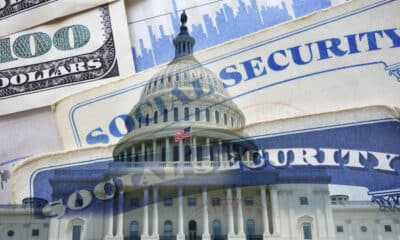Kaiser Health News
End of Pandemic Internet Subsidies Threatens a Health Care Lifeline for Rural America
Sarah Jane Tribble, KFF Health News
Wed, 05 Jun 2024 09:00:00 +0000
FORT HALL RESERVATION, Idaho — Myrna Broncho realized just how necessary an internet connection can be after she broke her leg.
In fall 2021, the 69-year-old climbed a ladder to the top of a shed in her pasture. The roof that protects her horses and cows needed to be fixed. So, drill in hand, she pushed down.
That’s when she slipped.
Broncho said her leg snapped between a pair of ladder rungs as she fell, “and my bone was sticking out, and the only thing was holding it was my sock.”
Broncho arm-crawled back to her house to reach her phone. She hadn’t thought to take it with her because, she said, “I never really dealt with phones.”
Broncho needed nine surgeries and rehabilitation that took months. Her hospital was more than two hours away in Salt Lake City and her home internet connection was vital for her to keep track of records and appointments, as well as communicate with her medical staff.
During the covid-19 pandemic, federal lawmakers launched the Affordable Connectivity Program with the goal of connecting more people to their jobs, schools, and doctors. More than 23 million low-income households, including Broncho’s, eventually signed on. The program provided $30 monthly subsidies for internet bills, or $75 discounts in tribal or high-cost areas like Broncho’s.
Now, the ACP is out of money.
In early May, Sen. John Thune (R-S.D.) challenged an effort to continue funding the program, saying during a commerce committee hearing that the program needed to be revamped.
“As is currently designed, ACP does a poor job of directing support to those who truly need it,” Thune said, adding that too many people who already had internet access used the subsidies.
There has been a flurry of activity on Capitol Hill, with lawmakers first attempting and failing to attach funding to the must-pass Federal Aviation Administration reauthorization. Afterward, Sen. Peter Welch (D-Vt.) traveled to his home state to tell constituents in tiny White River Junction that Congress was still working toward a solution.
As the program funding dwindled, both Democrats and Republicans pushed for new legislative action with proposals trying to address concerns like the ones Thune raised.
On May 31, as the program ended, President Joe Biden’s administration continued to call on Congress to take action. Meanwhile, the administration announced that more than a dozen companies — including AT&T, Verizon, and Comcast — would offer low-cost plans to ACP enrollees, and the administration said those plans could affect as many as 10 million households.
According to a survey of participants released by the Federal Communications Commission, more than two-thirds of households had inconsistent or no internet connection before enrolling in the program.
Broncho had an internet connection before the subsidy, but on this reservation in rural southeastern Idaho, where she lives, about 40% of the 200 households enrolled in the program had no internet before the subsidy.
Nationwide, about 67% of nonurban residents reported having a broadband connection at home, compared with nearly 80% of urban residents, said John Horrigan, a national expert on technology adoption and senior fellow at the Benton Institute for Broadband & Society. Horrigan reviewed the data collected by a 2022 Census survey.
The FCC said on May 31 that ending the program will affect about 3.4 million rural and more than 300,000 households in tribal areas.
The end of federal subsidies for internet bills will mean “a lot of families who will have to make the tough choice not to have internet anymore,” said Amber Hastings, an AmeriCorps member serving the Shoshone-Bannock Tribes on the reservation. Some of the families Hastings enrolled had to agree to a plan to pay off past-due bills before joining the program. “So they were already in a tough spot,” Hastings said.
Matthew Rantanen, director of technology for the Southern California Tribal Chairmen’s Association, said the ACP was “extremely valuable.”
“Society has converted everything online. You cannot be in this society, as a societal member, and operate without a connection to broadband,” Rantanen said. Not being connected, he said, keeps Indigenous communities and someone like “Myrna at a disadvantage.”
Rantanen, who advises tribes nationwide about building broadband infrastructure on their land, said benefits from the ACP’s subsidies were twofold: They helped individuals get connected and encouraged providers to build infrastructure.
“You can guarantee a return on investment,” he said, explaining that the subsidies ensured customers could pay for internet service.
Since Broncho signed up for the program last year, her internet bill had been fully paid by the discount.
Broncho used the money she had previously budgeted for her internet bill to pay down credit card debt and a loan she took out to pay for the headstones of her mother and brother.
As the ACP’s funds ran low, the program distributed only partial subsidies. So, in May, Broncho received a bill for $46.70. In June, she expected to pay the full cost.
When asked if she would keep her internet connection without the subsidy, Broncho said, “I’m going to try.” Then she added, “I’m going to have to” even if it means taking a lesser service.
Broncho said she uses the internet for shopping, watching shows, banking, and health care.
The internet, Broncho said, is “a necessity.”
——————————
By: Sarah Jane Tribble, KFF Health News
Title: End of Pandemic Internet Subsidies Threatens a Health Care Lifeline for Rural America
Sourced From: kffhealthnews.org/news/article/acp-federal-internet-discount-program-ends-tribes/
Published Date: Wed, 05 Jun 2024 09:00:00 +0000
Kaiser Health News
In Settling Fraud Case, New York Medicare Advantage Insurer, CEO Will Pay up to $100M
SUMMARY: Independent Health Association of Buffalo and Betsy Gaffney, CEO of medical analytics firm DxID, have agreed to a settlement of up to $100 million to resolve Justice Department allegations of fraudulent Medicare billing for exaggerated or non-existent health conditions. Independent Health will pay up to $98 million, while Gaffney will contribute $2 million. Neither party admitted wrongdoing. The case was triggered by whistleblower Teresa Ross, highlighting issues of “upcoding” in Medicare Advantage plans. Ross, having faced repercussions for her allegations, will receive at least $8.2 million from the settlement. This case underscores the challenges of regulating billing practices in the Medicare system.
The post In Settling Fraud Case, New York Medicare Advantage Insurer, CEO Will Pay up to $100M appeared first on kffhealthnews.org
Kaiser Health News
Employers Press Congress To Cement Health Price Transparency Before Trump’s Return
SUMMARY: Despite regulations requiring hospitals and insurers to disclose negotiated prices for healthcare services, the impact on consumer costs remains unclear nearly four years later. While the Trump administration’s initial rules and Biden’s enhancements aimed to streamline this data, compliance is inconsistent; a 2022 audit found only 63 out of 100 hospitals met requirements. Some lawmakers proposed legislation to protect these regulations amid uncertainty about Trump’s potential return to office, but efforts fell short. Experts note the complexity of the data often leaves consumers struggling to understand their actual costs, emphasizing the need for improved transparency and enforcement to facilitate informed healthcare choices.
The post Employers Press Congress To Cement Health Price Transparency Before Trump’s Return appeared first on kffhealthnews.org
Kaiser Health News
He Went in for a Colonoscopy. The Hospital Charged $19,000 for Two.
SUMMARY: Tom Contos, a 45-year-old runner, sought a colonoscopy due to ongoing rectal bleeding. His insurance covered part of the procedure, but he was shocked by the final bill of $19,206, which included charges for two colonoscopies. Despite an initial estimate of $7,203, the charges were much higher due to multiple procedures and biopsies. Contos appealed the charges, but Northwestern Medicine maintained that the billing was correct. Health experts suggest patients consider alternatives like ambulatory surgery centers for lower costs. Transparency and clear pricing are key to avoiding unexpected medical expenses.
The post He Went in for a Colonoscopy. The Hospital Charged $19,000 for Two. appeared first on kffhealthnews.org
-

 News from the South - Arkansas News Feed7 days ago
News from the South - Arkansas News Feed7 days agoFaith-inspired ministry opens health clinic in Little Rock
-

 News from the South - Florida News Feed6 days ago
News from the South - Florida News Feed6 days ago‘Dirty Dancing,’ ‘Beverly Hills Cop,’ ‘Up in Smoke’ among movies entering the National Film Registry
-

 Our Mississippi Home6 days ago
Our Mississippi Home6 days agoThe Meaning of the Redbird During the Holiday Season
-

 Mississippi Today5 days ago
Mississippi Today5 days agoMississippi PERS Board endorses plan decreasing pension benefits for new hires
-

 Local News2 days ago
Local News2 days agoHard Rock Hotel & Casino Biloxi Honors Veterans with Wreath-Laying Ceremony and Holiday Giving Initiative
-

 News from the South - North Carolina News Feed2 days ago
News from the South - North Carolina News Feed2 days agoSocial Security benefits boosted for millions in bill headed to Biden’s desk • NC Newsline
-

 News from the South - Missouri News Feed3 days ago
News from the South - Missouri News Feed3 days agoCould prime Albert Pujols fetch $1 billion in today's MLB free agency?
-

 Mississippi News Video3 days ago
Mississippi News Video3 days ago12/19- Friday will be breezy…but FREEZING by this weekend
































